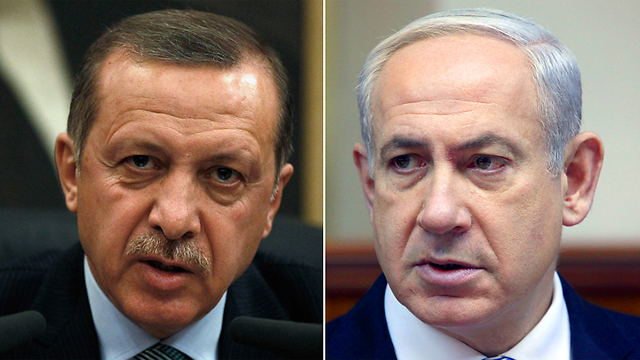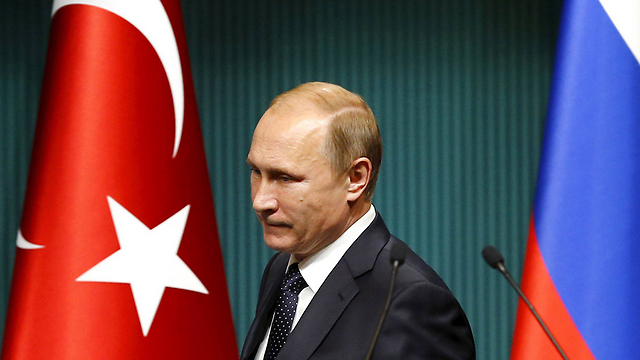
Netanyahu and Erdogan's shared interests
Analysis: An agreement between Israel and Turkey has yet to come, but there is a declarative cooperation: The Turkish President needs it as a card he can play in front of the Russians, while Netanyahu can use it to defend the government's natural gas plan in Israel's high court.
The celebrations are exaggerated because there is yet no agreement between Turkey and Israel regarding the normalization of relations. Turkey is still demanding that Israel remove its naval blockade of Gaza, a blockade which Turkish President Recep Tayyip Erdogan calls a "siege". Israel is claiming that there is no siege of Gaza, and rightfully so, and for the time being it doesn't seem like the PM or Defense Minister are even considering removing the naval blockade. Such a move would allow Hamas' military wing to import weapons not only from Iran, but from Libya and other places as well.

In any case, Erdogan said in public this week that he will not agree to normalize relations with Israel until Israel removes the blockade from Gaza and no one heard him, and he hasn't sent anyone to compromise on this in his name either. The only Turkish capitulation so far is an agreement in principle to the Israeli demand of preventing Hamas leader Salah al-Arouri from operating within Turkey. That agreement in principle was conveyed by an Israeli source who is conducting negotiations with the director general of the Turkish Foreign Ministry, but the Turks haven't announced it officially – on the contrary, they've said there's no agreement yet.
"God and the devil are in the details," says the old phrase, and when you look at what was discussed regarding the future gas imports from Israel to Turkey you can see at least two major landmines in the proverbial ground. One is the Turkish demand that all of Israel's gas exports to Europe, or at least a large portion of them, go through Turkey. This means a pipeline going from the Israeli gas fields to Turkey, and from there on to the Balkan states.
Such an arrangement, if put into practice, would be highly dangerous to Israel and its gas exports, since it allows the Turks to keep their hands on the faucet and determine if Israel can export gas to Europe, and in what amounts. We of course know the quick-to-anger and unpredictable nature of Erdogan, and allowing the Turkish ruler to pressure us whenever he wants to by using the gas lever would be a foolish move, from a diplomatic and economic standpoint. Perhaps from a security standpoint as well.

In addition, Israel has already reached agreements and understandings with Cyprus and Greece, according to which the Israeli gas from the fields in the Mediterranean will reach Europe through them. Cyprus and Greece are members of the European Union, and that way the transfer of gas from Israel to future consumers in Europe is safely assured. Furthermore, Israel has an interest in preserving the good relations between Cyprus and Greece, among other reasons because the Cyprian gas fields in the sea are right by those Israel has discovered. Such good relations could prevent future conflicts and international lawsuits.
In this context, we need to keep in mind that Turkey and the Greek part of Cyprus have a hostile relationship, and that diverting the gas exports to Europe from Cyprus to Turkey could cause problems and even lawsuits, since arrangements on this matter have already been reached with the Cypriots. Prime Minister Benjamin Netanyahu is the one who reached those agreements, and so it's clear why the Cypriot Prime Minister was alarmed and phoned Netanyahu urgently Thursday night. It's not hard to imagine what the Cypriot president wanted to talk about with his Israeli colleague.
You can assume that Israel has no intention of exporting its gas to Europe through Turkey due to the problematic past, and even more problematic character, of it's leader Erdogan, who will probably stay in power for many years to come. So it seems that for now, the agreement normalizing international relations between the two countries is still up in the air, and the gas business is also a yet-unformed issue.
And so the question arises: Why was the PM's Office so quick to leak the news about a nearing agreement on normalizing relations and gas exports to Turkey on Thursday?
The answer is simple: Netanyahu needs a Turkish statement of willingness to buy Israeli gas in order to prove that the gas plan has a security and stately effect of binding Israel and Turkey by their common interest. This can be used to defend the plan against challenges to it in the High Court of Justice (HCJ).
In challenges to the gas plan that are expected to be submitted to the court next week, plaintiffs will claim that circumventing the authority of the Antitrust Commissioner by using article 52 of the law wasn't justified by security and diplomatic concerns as the PM claimed. This comes after Egypt and Jordan have stated that they won't purchase gas from Israel. The Turkish pronouncement of willingness to buy Israeli gas serves the PM when he comes forth to show the diplomatic relevancy of the gas plan.
And what does Erdogan get? He can tell the Russians, with whom he has recently collided (by downing the Russian fighter jet in Turkish airspace), "I don't need your gas, I'll purchase some from Israel." That claim is absurd, since Turkey imports between a third and half of the gas it consumes from Russia, and Israel won't be able to supply it with an amount that even approaches that in the next few years.
Having said that, the Israeli gas is certainly a card that Erdogan can wave in the face of Russia, who is still considering whether to halt gas supplies to Turkey or not. You never know if Putin might be hesitant, but the fact that Russia has to keep Israel in mind isn't bad for our foreign relations. The bottom line is that an intriguing alignment of interests has been created between Netanyahu and Erdogan, one that is only present on the declarative plain for now. Netanyahu needs this partnership for the HCJ, Erdogan needs it for the Russians. A real agreement on the subject of normalizing relations and exporting gas to Turkey is still far from view.











